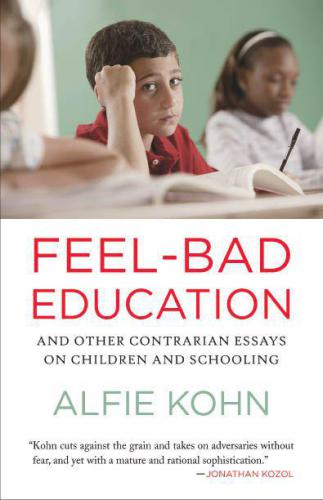
Feel-Bad Education
And Other Contrarian Essays on Children and Schooling
کتاب های مرتبط
- اطلاعات
- نقد و بررسی
- دیدگاه کاربران
نقد و بررسی

February 21, 2011
Educator Kohn (Punished by Rewards) presents 19 essays (previously published in such newspapers and journals as the New York Times and Education Week) in this spirited and incisive probe of education today. Though Kohn can be witty and wry, his overarching message is quite sobering: he's convinced that "historians will look back at our era of ever-higher standards and increasingly standardized instruction as a dark period in American education." Kohn regards the one-size-fits-all approach as a serious mistake: instead of educating the "whole child" in an individualized manner that nourishes a love of learning, the trend is to produce students who can memorize facts that are soon forgotten. Along with standardized tests, Kohn debunks homework and grades, and in a piece entitled "How to Create Nonreaders" reveals that a sure way to destroy children's love of reading and writing is to require written reports, offer incentives, quantify assignments or focus on skills—all common practices in our classrooms. True "progressive education" is very hard to find, the author claims, which is one reason it can't be blamed for the failings of our educational system. With plenty of data to back up his contrarian views, Kohn asks readers to take a hard look at where America's classrooms are heading and do whatever is necessary to turn schools from "test prep centers" into joyful environments where kids learn to think for themselves.

March 15, 2011
A philosophical, well-structured argument for viable progressive education from one of the movement's most prolific and well-regarded authors.
In the introduction to his 19 succinct essays, Kohn (The Homework Myth, 2006, etc.) lays out 12 points that he thinks should be "Well Duh" moments for educators: essentially what he considers to be irrefutable tenets that somehow get lost in practical application. The points radiate around the same theme—that students are humans, and humans learn through participation, interest and engagement, rather than memorization of facts and recitation of those facts through standardized testing. The material that follows, which is broken up into five major sections ("Progressivism and Beyond," "The Nuts and Bolts of Learning," "Climate & Connections: How Does School Feel to the Students?" "The Big Picture: Education Policy" and "Beyond the Schools: Psychological Issues & Parenting") is not a step-by-step plan, but rather a carefully considered interrogation of the way we teach and how we might inject some of the "Well Duh" concepts back into classroom learning. Despite the comprehensive references that end each chapter, Kohn's arguments are, in keeping with his classroom philosophy, hardly recitations of his research, but rather ideas, often with his own experience as a teacher as the backing evidence. He is unapologetic for some of his unconventional philosophy, advocating that teachers give less homework, for example, that they seek out students that challenge them in the classroom, that they think outside the rubric in planning lessons and evaluating students, and that test preparation and quantified reading assignments and report writing are killing student motivation. In the title essay, he tackles the fundamental and so often overlooked concept of happiness in education, asking not only when schools became places so devoid of joy, but why getting it back became such a low priority.
A vital wake-up call to educators.
(COPYRIGHT (2011) KIRKUS REVIEWS/NIELSEN BUSINESS MEDIA, INC. ALL RIGHTS RESERVED.)

January 1, 2011
Few scholars are more critical or more forthright about the problems with the U.S. educational system than Kohn. For years, he has spoken out against homework, high-stakes testing, the problems of extrinsic rewards, and other issues. Here he collects his essays published in a range of outlets, from the Phi Delta Kappan to the New York Times, over the last eight years. The main theme is that we know what practices make for a terrible educational experience yet we continue with them anyway because of inertia, politics, conventional wisdom, or even greed. In the title essay, Kohn disagrees with the assumption that high educational standards mean a joyless educational experience. VERDICT Kohn, a surprisingly accessible and at times witty educational policy expert, raises lots of issues about the educational system and how we might improve it. Readers interested in educational policy--parents, students, or professionals--will find Kohn's well-written essays thought-provoking, even if they do not agree with his conclusions.--Mark Bay, Univ. of the Cumberlands Lib., Williamsburg, KY
Copyright 2011 Library Journal, LLC Used with permission.

























دیدگاه کاربران